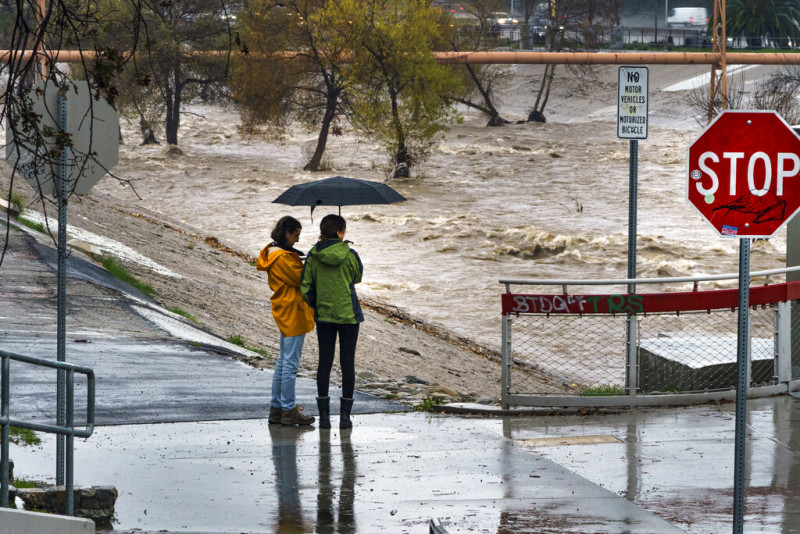Fires, floods, hurricanes, heat waves – These are phenomena that have caused special concern to experts
The signs of climate change fires, floods, hurricanes, heat waves, are now very evident from end to end all over the planet. As summer draws to a close, the BBC publishes an extensive report on the six extreme weather events that hit the planet this summer as a result of climate change and their consequences. Among the extreme weather phenomena are the unprecedented fires in Greece
These are phenomena that have caused particular concern to experts. In the first week of July, the planet saw its hottest day on record, when the average global temperature reached 17.23 degrees Celsius. This broke the previous 2016 record of 16.92C.
In the Mediterranean, millions of people have seen firsthand what extreme heat looks like. Two heat waves hit countries across the region.
1. Heatwave in the UK
Record heat was set in 74% of UK areas. The average temperature, counting days and cooler nights, was 15.8 degrees Celsius. This eclipsed the previous record by 0.9 degrees Celsius and was a significant leap from a climate perspective.
Record temperatures were recorded in 72 of the 97 UK areas where temperature data is collected.
2) Greek fires
One million tons of carbon dioxide were released into the atmosphere by the Greek fires.
The extreme heat that hit the Mediterranean last July resulted in dry conditions for wildfires. Between July 1 and 25, the huge fires in Greece emitted one million tons of carbon dioxide. That’s the most for any July fire in the country on record, and as many as London, one of the world’s most populous cities, has emitted in nearly two weeks, according to 2019 figures.
From the fire in Rhodes
By the end of the month, scientists from the World Weather Attribution Group – which examines the role of climate change in specific extreme weather events – had analyzed the data and concluded that heatwaves would be “virtually impossible” without climate-induced climate change. climate change.
El Niño, which began in June, could help make 2023 the hottest year on record, scientists believe. The powerful natural phenomenon is linked to warmer temperatures and occurs every two to seven years when warm water rises to the surface in the Pacific off the coast of South America.
3) Typhoon Doksuri
Typhoon Doksuri resulted in $15 billion in economic losses.
More than a million people were evacuated as winds reached 150 miles per hour. In Beijing, the amount of rain that fell broke a 140-year-old record. The floods damaged roads and bridges, submerged cars and destroyed construction sites.
In the Philippines, at least 26 ferry passengers died near Manila when a boat capsized in strong winds.
In the months leading up to the typhoon, China, South Korea and other parts of East Asia had experienced heatwaves with record temperatures.
4) Firesin Hawaii
At least 388 people are dead or missing after the wildfires in Hawaii. On August 8, the island of Maui in Hawaii faced a deadly wildfire. Much of the island was in drought, and the dry vegetation provided the ideal fuel to spread the flames, fanned by raging winds from a passing hurricane.
5) Fires in Canada
15.6 million hectares burned in the fires in Canada. On August 19, another large fire started in eastern Canada. Fifteen thousand households were ordered to evacuate, while hundreds of miles to the north, a massive fire threatened the city of Yellowknife in the Northwest Territories.
So far 15.6 million hectares (37.8 million acres) of land have burned across Canada – an area larger than New York state or England.
At least 1,000 fires are still burning as Canada experiences its worst fire season on record.
Scientists expect that as global warming intensifies, wildfires will become more intense.
6) Flooding in California
26 million people are at risk of flooding in California. On August 21, the usually wildfire-prepared state of California saw its first tropical storm in 84 years.
Hurricane Hilary made landfall in northern Mexico, killing at least one person when a family of five was swept out to sea.
The storm put 26 million people in the state at risk and 25,000 households across Los Angeles were without power as the storm moved through the city and caused flash flooding.
Source :Skai
With a wealth of experience honed over 4+ years in journalism, I bring a seasoned voice to the world of news. Currently, I work as a freelance writer and editor, always seeking new opportunities to tell compelling stories in the field of world news.















